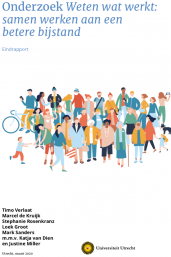Final report What works (Weten wat werkt)

What is the best way to guide people on social assistance (back) towards paid work or other forms of social participation? To answer this question a group of researchers from Utrecht conducted the study What works (Weten wat werkt) on behalf of the Municipality of Utrecht. For the study, 787 people entitled to social assistance in Utrecht (Zeist) were randomly divided into four different treatment groups (randomised controlled trial). Each group received a different treatment for sixteen months. One group received extra help and guidance, one group received an exemption from the obligation to find and accept work and was free to choose whether or not they wanted to be counselled by the municipality’s welfare agency, and one group was allowed to keep a larger part of their income from work as extra income on top of their benefits and to do so for a longer period of time. The fourth group, the control group, received care-as-usual.
To answer the research question, the researchers looked at effects on labour participation, social participation, health and well-being, client satisfaction and the financial situation of claimants.
The research was conducted by Stephanie Rosenkranz, Loek Groot, Timo Verlaat en Mark Sanders, all affiliated with Utrecht University School of Economics (U.S.E.).
The final report and related information is available as pdf and can be downloaded from this page.
Final report
Online appendix report
- Master's thesis Anne Kool (in Dutch): Blij in de bijstand
- Master's thesis Myrthe Jansen (in Dutch): De nieuwe werkwijze van de werkmatchers: is dit een match?
- Questionnaires in Dutch and English
- Communication material (in Dutch)
- 'Menukaart' group Met extra hulp in actie (in Dutch)

